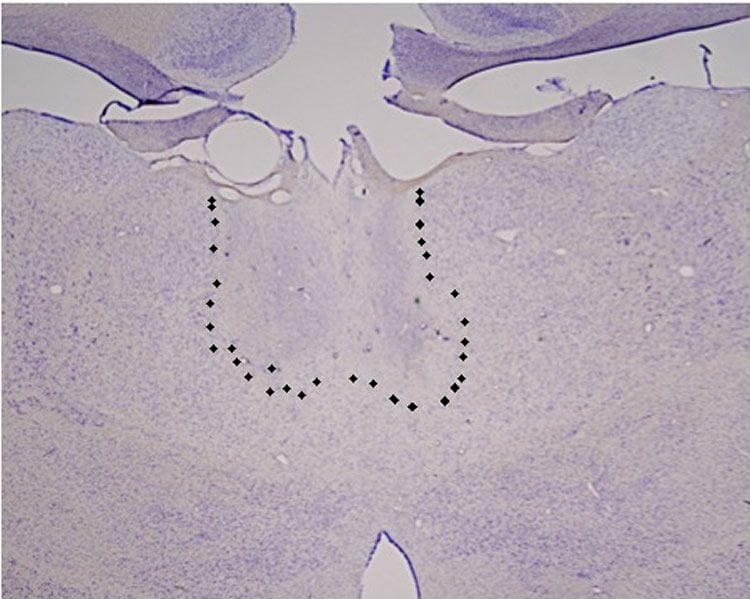Summary: Researchers report the mediodorsal thalamus plays a key role in rapidly updating information as we learn.
Source: University of Oxford.
Mediodorsal thalamus allows us to incorporate new information in decision-making.
Scientists have confirmed one of the brain areas responsible for rapid updating of information during learning – the sort of information we use to negotiate many changing situations in everyday life.
In a study funded by the Medical Research Council and published in journal eLife, a team from Oxford University and Imperial College looked at an area called the mediodorsal thalamus (MD), known to be involved in decision making and learning.
Senior author and Oxford researcher Dr Anna Mitchell explained: ‘We already knew that the mediodorsal thalamus is involved in learning and decision making but did not fully understand the role it played. A key question in neurosciences is how the brain computes functions like planning a day’s activities or making a decision to do one thing rather than another. We process information using widespread networks across the brain, so it is useful to focus on the contribution of particular areas to the overall task. In this case, we chose to look at how the mediodorsal thalamus supports optimal processing of new learning and decision making.’
The study used Rhesus macaque monkeys, who were taught cognitive tasks on touchscreen computers that released food rewards for learning new information and making good choices. These tests were then repeated after surgery that induced selective lesions to the MD.
Monkeys who could not use their MD were less able to respond to changes that required them to adapt their behaviour to continue making the right choices to maximise rewards. They also struggled with their decisions when they were presented with a choice of several differently rewarded options.
Dr Mitchell said: ‘Previously, some had thought that in these cases the monkeys would just keep repeating the same choice as before. We found that they could make different choices but they had a reduced ability to integrate information from recent choices that they had made combined with the result of their most recent choice to optimally guide their decisions.

‘This study has shown that the mediodorsal thalamus has a key role in rapidly integrating new information to learn something new or make a decision. This skill is vital in day-to-day activities like driving or even just walking down a busy street.’
Future studies will look at how the MD interacts with other areas of the brain, helping us to understand the processes that underlie our own abilities to learn, re-learn and adapt our choices as we get new information.
Funding: Medical Research Council and Wellcome Trust funded this study.
Source: University of Oxford
Image Source: This NeuroscienceNews.com image is credited to the researchers/eLife.
Original Research: Full open access research for “Critical role for the mediodorsal thalamus in permitting rapid reward-guided updating in stochastic reward environments” by Subhojit Chakraborty, Nils Kolling, Mark E Walton, and Anna S Mitchell in eLife. Published online May 2 2016 doi:10.7554/eLife.13588
[cbtabs][cbtab title=”MLA”]University of Oxford. “Brain Area Responsible for Learning From Immediate Experience Identified.” NeuroscienceNews. NeuroscienceNews, 31 May 2016.
<https://neurosciencenews.com/mediodorsal-thalamus-learning-experience-4345/>.[/cbtab][cbtab title=”APA”]University of Oxford. (2016, May 31). Brain Area Responsible for Learning From Immediate Experience Identified. NeuroscienceNews. Retrieved May 31, 2016 from https://neurosciencenews.com/mediodorsal-thalamus-learning-experience-4345/[/cbtab][cbtab title=”Chicago”]University of Oxford. “Brain Area Responsible for Learning From Immediate Experience Identified.” https://neurosciencenews.com/mediodorsal-thalamus-learning-experience-4345/ (accessed May 31, 2016).[/cbtab][/cbtabs]
Abstract
Critical role for the mediodorsal thalamus in permitting rapid reward-guided updating in stochastic reward environments
Adaptive decision-making uses information gained when exploring alternative options to decide whether to update the current choice strategy. Magnocellular mediodorsal thalamus (MDmc) supports adaptive decision-making, but its causal contribution is not well understood. Monkeys with excitotoxic MDmc damage were tested on probabilistic three-choice decision-making tasks. They could learn and track the changing values in object-reward associations, but they were severely impaired at updating choices after reversals in reward contingencies or when there were multiple options associated with reward. These deficits were not caused by perseveration or insensitivity to negative feedback though. Instead, monkeys with MDmc lesions exhibited an inability to use reward to promote choice repetition after switching to an alternative option due to a diminished influence of recent past choices and the last outcome to guide future behavior. Together, these data suggest MDmc allows for the rapid discovery and persistence with rewarding options, particularly in uncertain or changing environments.
“Critical role for the mediodorsal thalamus in permitting rapid reward-guided updating in stochastic reward environments” by Subhojit Chakraborty, Nils Kolling, Mark E Walton, and Anna S Mitchell in eLife. Published online May 2 2016 doi:10.7554/eLife.13588






